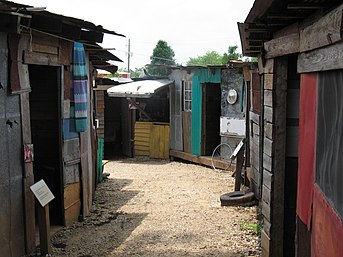
Back الافتقار إلى الطاقة Arabic Pobresa energètica Catalan Energetická chudoba Czech Tlodi ynni Welsh Energiearmut (Sozialpolitik) German Ενεργειακή φτώχεια Greek Pobreza energética Spanish Energia pobrezia Basque فقر انرژی Persian Energiaköyhyys Finnish

In developing countries and some areas of more developed countries, energy poverty is lack of access to modern energy services in the home.[1] In 2022, 759 million people lacked access to consistent electricity and 2.6 billion people used dangerous and inefficient cooking systems.[2] Their well-being is negatively affected by very low consumption of energy, use of dirty or polluting fuels, and excessive time spent collecting fuel to meet basic needs.
Predominant indices for measuring the complex nature of energy poverty include the Energy Development Index (EDI), the Multidimensional Energy Poverty Index (MEPI), and Energy Poverty Index (EPI). Both binary and multidimensional measures of energy poverty are required to establish indicators that simplify the process of measuring and tracking energy poverty globally.[3] Energy poverty often exacerbates existing vulnerabilities amongst underprivileged communities and negatively impacts public and household health, education, and women's opportunities.[4]
According to the Energy Poverty Action initiative of the World Economic Forum, "Access to energy is fundamental to improving quality of life and is a key imperative for economic development. In the developing world, energy poverty is still rife."[5] As a result of this situation, the United Nations (UN) launched the Sustainable Energy for All Initiative and designated 2012 as the International Year for Sustainable Energy for All, which had a major focus on reducing energy poverty.
The term energy poverty is also sometimes used in the context of developed countries to mean an inability to afford energy in the home. This concept is also known as fuel poverty or household energy insecurity.[1]
- ^ a b Bouzarovski, Stefan; Petrova, Saska (2015-11-01). "A global perspective on domestic energy deprivation: Overcoming the energy poverty–fuel poverty binary". Energy Research & Social Science. 10: 31–40. doi:10.1016/j.erss.2015.06.007. ISSN 2214-6296.
- ^ "Goal 7 | Department of Economic and Social Affairs". sdgs.un.org. Retrieved 2022-04-15.
- ^ Cite error: The named reference
Pelz-2018was invoked but never defined (see the help page). - ^ Cite error: The named reference
United Nations-2015was invoked but never defined (see the help page). - ^ "Access2017". Archived from the original on 2019-08-01. Retrieved 2018-04-24.
© MMXXIII Rich X Search. We shall prevail. All rights reserved. Rich X Search